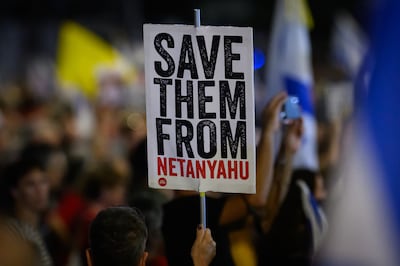Live updates: Follow the latest on Israel-Gaza
Israeli Prime Minister Benjamin Netanyahu criticised Emmanuel Macron on Saturday after the French President called for a halt to arms sales to Israel if the weaponry is used in Gaza.
Speaking at a summit on Saturday, Mr Macron said a ceasefire is “necessary in Gaza, as in Lebanon”.
“We can’t demand a ceasefire while also sending weapons,” he said. “That’s just consistency.”
Separately, in an interview with France Inter radio, Mr Macron said the priority should be a political solution and that "arms used to fight in Gaza are halted", adding that his country's focus was avoiding escalation.
"The Lebanese people must not, in turn, be sacrificed, and Lebanon cannot become another Gaza," Mr Macron said.
Those comments sparked a fierce response from Mr Netanyahu, whose army is fighting against groups backed by Iran.
“As Israel fights the forces of barbarism led by Iran, all civilised countries should be standing firmly by Israel's side. Yet, President Macron and other western leaders are now calling for arms embargoes against Israel. Shame on them,” Mr Netanyahu said.
France is not one of the biggest weapons providers to Israel. It shipped military equipment worth $33 million last year, according to the Defence Ministry's annual arms exports report.

For a year, Israel has bombarded Gaza, killing more than 41,800 Palestinians in a reprisal to Hamas's unprecedented and deadly incursion into southern Israel on October 7. About 1,200 people were killed that day and 240 taken hostage.
The Lebanese armed group and political party Hezbollah launched rockets at Israel the day after the conflict between Hamas and Israel began. Hezbollah, acting in support of its ally Hamas, initiated attacks that led to nearly a year of fighting primarily concentrated along the Lebanon-Israel border.
But in the last couple of weeks the situation has escalated significantly, with Israel invading Lebanon and bombarding parts of Beirut. Israel and Hezbollah have engaged in combat on the border.
The escalation by Israel has forced a million people in Lebanon from their homes, left more than a thousand killed, and large chunks of Beirut and south Lebanon in ruins.
Elsewhere, Yemen's Houthis and Iran-backed groups in Iraq have continued to launch attacks on Israel.
“This axis of terror stands together. But countries who supposedly oppose this terror axis call for an arms embargo on Israel. What a disgrace,” Mr Netanyahu said.
Israel has vowed to retaliate following a significant Iranian bombardment of its military bases and other targets earlier this week, heightening concerns of a broader conflict across the region.
